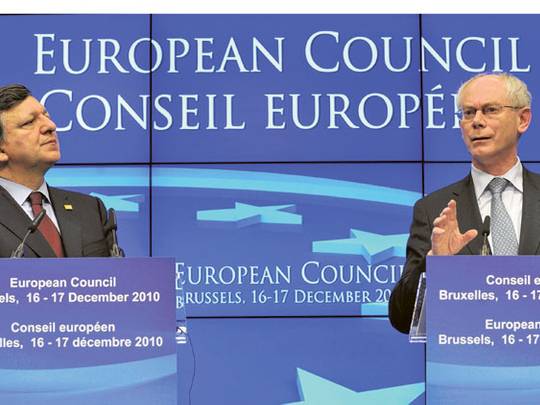
Brussels: European Union leaders agreed on Thursday to create a permanent financial safety net from 2013 and the European Central Bank moved to increase its firepower to fight the debt crisis that has rocked the Eurozone.
But at Germany's insistence, the 27 leaders said the long-term crisis-resolution mechanism, to be added to the EU's governing treaty, could only be activated "if indispensable to safeguard the stability of the euro as a whole".
They also decided there was no need to increase an existing temporary rescue fund, which some analysts say could be insufficient if Spain and Portugal need EU/IMF bailouts after Greece and Ireland, nor did they discuss using it more flexibly.
"The heads of state and government of the Eurozone stand ready to do whatever is necessary to ensure the stability of the Eurozone as a whole," European Council President Herman Van Rompuy told a news conference after chairing the first day of a two-day EU summit.
The ECB, in charge of monetary policy in the 16-nation euro area, said it would almost double its capital to €10.76 billion (Dh52.39 billion) to cope with bigger credit risk and market volatility. Eurozone members will provide the increase.
ECB President Jean-Claude Trichet told reporters the central bank's governing council thought it was appropriate to make "additional provisioning" — a veiled reference to potential losses on Eurozone sovereign bonds it has bought.
IMF Managing Director Dominique Strauss-Kahn, who has been critical of EU leaders' disjointed response to the rolling crisis, said he was concerned about slow growth and the threat of contagion in Europe.
"I'm worried and that's why I'm urging the Europeans to provide for a comprehensive solution, because this piecemeal approach obviously doesn't work," Strauss-Kahn told a Thomson Reuters Newsmaker event in Washington. "And the markets are just waiting for what's next."
Record seventh summit
The leaders — holding a record seventh summit this year — approved a two-sentence amendment to the EU treaty at Germany's behest to permit the creation of a European Stability Mechanism to handle financial crises from 2013, Van Rompuy said.
The ESM, to replace a temporary European Financial Stability Facility created in May, will be empowered to grant loans on strict conditions to member states in distress, with private sector bondholders sharing the cost of any sovereign debt writedown on a case-by-case basis.
The aim is for all 27 member states to ratify the change by end 2012. Van Rompuy said no country would need to put it to a referendum, removing one potential risk. Decisions will be taken by unanimity, ensuring that EU paymaster Germany retains a veto.
The EU, together with the IMF, has set up a €750 billion emergency loan pool to help highly indebted Eurozone states unable to finance themselves in volatile markets.
The decision by the Frankfurt-based ECB to raise its subscribed capital base was the first such increase in its 12-year lifetime, a mark of the severity of the situation.
The central bank has bought some €72 billion in Eurozone government bonds since May but has resisted political pressure to step up these asset purchases substantially to help indebted governments avoid having to seek a bailout.
Strauss-Kahn said he was concerned about the length of the process Europe was going through to resolve its crisis and said the EU needed to find a "comprehensive" solution.
But he voiced optimism that Spain would be able to ward off the worst of the debt crisis without needing a rescue, and said he saw no threat to the euro's existence.
Merkel gets her way
German Chancellor Angela Merkel, who pressed for the treaty change to assuage Germany's constitutional court, got her way by keeping other ideas, such as increasing the size of the EFSF or issuing Eurozone bonds, off the summit agenda.
She said earlier she had settled a public spat with Jean-Claude Juncker, who chairs the finance ministers of the Eurozone, over his call to issue common euro area bonds.
The head of the European Parliament, Jerzy Buzek, told leaders at the summit that euro bonds should not be dismissed. Strauss-Kahn said they could be a useful tool if Europe became more centralised, but could not be a starting point now.
Merkel contends so-called E-bonds would remove the incentive for countries to balance their budgets, and raise Berlin's own borrowing costs.












